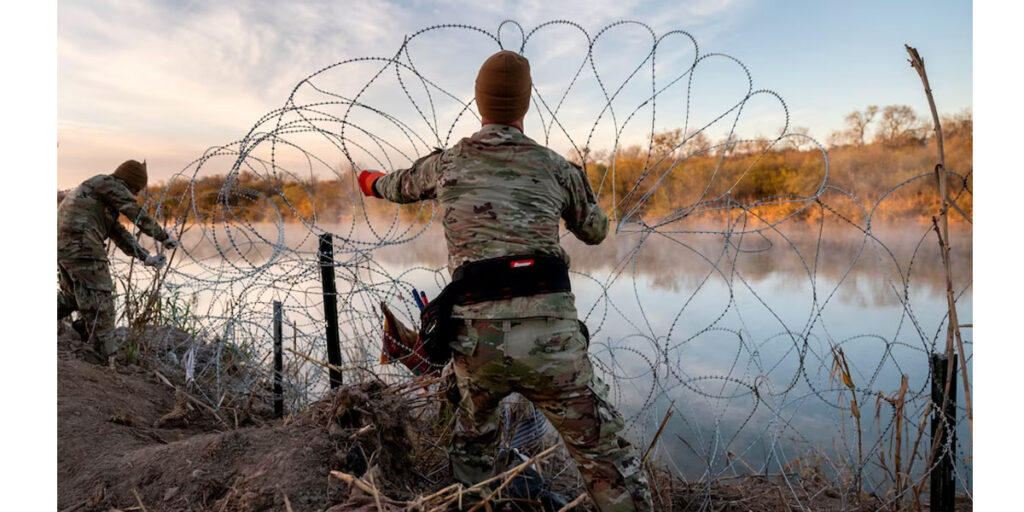In the latest chapter of a protracted and acrimonious conflict between the state of Texas and the Biden administration, the United States Supreme Court has rendered a decision that marks a significant turn in the ongoing saga of border security measures. By a slim margin of 5-4, the Supreme Court ruled in favor of allowing federal border agents to dismantle the razor wire fortifications installed by Texas along its border with Mexico. This contentious barrier, spanning a 30-mile stretch near Eagle Pass, has become a flashpoint in the battle over how to manage the nation’s southern border.
Texas passed and funded a law last month making illegal immigration a state crime as well as federal. States have a wide latitude in protecting themselves when public safety is at risk. Illegal immigrants into Texas over the past few years have been in the millions, creating a public safety and humanitarian nightmare.
The razor wire, put up by Texas under Governor Greg Abbott’s orders, represents a drastic measure by the state to assert control over its border. Governor Abbott, critical of the federal government’s efforts, or lack thereof, in securing the border, took aggressive steps to fortify it. He deployed state troops, seized land along the Rio Grande, and erected barriers, including razor wire, to stave off what he perceived as a surge in illegal immigration. This militaristic approach, while resonating with some constituents, has drawn sharp criticism for its potential harm to migrants and the environment.
The dispute over the razor wire escalated when the Department of Justice (DOJ) filed a lawsuit in January, challenging the state of Texas’ actions. The DOJ argued that Customs and Border Protection (CBP) agents must have “without warrant” access to all land within 25 miles of the border. The DOJ contended that the razor wire was not only a physical obstruction but also a hindrance to the agency’s ability to fulfill its responsibilities. “Like other law-enforcement officers, Border Patrol agents operating under difficult circumstances at the border must make context-dependent, sometimes split-second decisions about how to enforce federal immigration laws while maintaining public safety,” the DOJ stated in its suit. The injunction, they argued, “prohibits agents from passing through or moving physical obstacles erected by the State that prevent access to the very border they are charged with patrolling and the individuals they are charged with apprehending and inspecting.”
Governor Abbott, undeterred, continued to advocate for Texas’ right to secure its own border. His administration’s stance was echoed by other Republican figures, such as Rep. Andy Biggs, who commented, “Texas was finally beginning to regain control of its border with Mexico when it took matters into its own hands. The Biden Administration is going to do anything that it can to destroy America’s sovereignty.”
The legal wrangling over the razor wire is part of a broader, more complex confrontation between the Biden administration and Texas over immigration policy. Alongside the razor wire dispute, the DOJ has taken Texas to court over a new law, SB4, which deems illegal entry into the U.S. a state crime and empowers state officials to conduct deportations. This law, signed in December, is set to take effect in March, adding another layer of complexity to the already strained relationship between federal and state authorities.
In delivering its ruling, the Supreme Court has not only given a procedural victory to the Biden administration but also illuminated the profound divisions within the country regarding border security and immigration policy. The razor wire, a symbol of Texas’ hardline stance, has been decried as both inhumane and ineffective by critics. Meanwhile, the Biden administration faces mounting pressure from both sides of the political aisle, with some calling for more stringent border control measures and others advocating for a more compassionate and humanitarian approach to immigration.
The Supreme Court’s decision in the Texas razor wire saga represents a pivotal moment in the ongoing struggle over immigration policy in the United States. Should Texas be able to protect itself? Or does Texas have to submit to the Biden Administration’s all out assault on Texas’ sovereignty and safety by refusing to prevent illegal immigration across the border?
This is a breach of Constitutional guarantees dating back to our founding fathers.
This is war.
